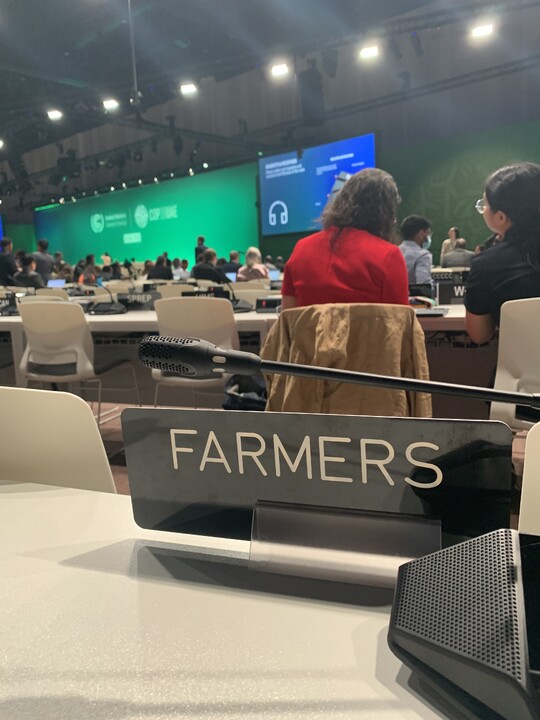Blog
Perspective on COP28: From a Prairie Sod House to Dubai
A farmer’s experience of the UN climate convention, COP28
Farm Foundation President and CEO Shari Rogge-Fidler reflects on her experience at COP28 as part of the Solutions from the Land farmer delegation to Dubai. It was originally published as a LinkedIn article. Solutions from the Land has published additional comments on COP28 on their blog.
I had the distinct honor and privilege of being part of a delegation of US farmers attending the UN climate conference in Dubai, COP28. As a 5th-generation farm owner and operator from Nebraska, my ancestors began life on the prairie in a sod house made from the soil. Little did they know that farming was going to go through a huge transformation. We have learned so much in the last few decades about the importance of soil and how it can be managed for the benefits of agriculture, humans and the environment, including sequestering carbon.
Farmers provide the basic human needs for people – food, fiber for clothing, energy – and ecosystem services for our planet.
For these reasons, it is critical to have farmers at the table for any discussions on changes in the food and agriculture system, to ensure their expertise is leveraged for increased effectiveness as well as preventing unintended consequences of policies and decisions that might detrimentally affect supplying the world with what they need for life.
I was part of the US delegation of 10 farmers who participated in the broader global farmer constituency of approximately 40-50 people from Africa, Asia, Australia, Europe and more. We were part of the official “blue zone” where the negotiations occurred, which had approximately 18,000 people. There was also a “green zone” and a total of 100, 000 people attending the broader activities of COP28. The farmer constituency met daily to report on progress with the negotiations, highlight issues, and events where a farmer perspective would be helpful or necessary.
The key issues the farmer constituency focused on were ensuring the negotiation process moved forward for food and agriculture and not letting the wishes of a few countries to establish a new and permanent body delay the progress. The second issue involved editing some of the key documents to include the word “farmer” in the lists of constituents called out as important in the negotiations and implementation, with the view that farmers need to be involved in providing input and guidance on any commitments and implementation.

The farmer constituency had the opportunity to make a formal statement in the room with the leaders of the negotiations early in the process and at the closing session. We literally had a place and place card at the formal UN table that said “Farmer.”
We also met directly with other key leaders, including US Secretary Vilsack, as well as our own US negotiator and senior climate advisor to hear firsthand how the process was going and to provide feedback.
These opportunities were set in the context of the food and agriculture declaration launched on day one of COP28, garnering the most recently reported and growing number of 152 countries signing on with support, including the US. We also experienced the historic milestone of a dedicated food and agriculture day, enabling many of the issues and opportunities to be highlighted through dialogues and presentations across the convention space.
The closing statement of the farmer constituency highlighted the disappointment of the documents not including farmers specifically, while mentioning the food system:
“We deeply believe that farmers’ voices must be heard. We call for a greater consideration of our priorities in all decisions that impact us. Climate finance must deliver for all farmers by involving them directly in the design and governance of climate programmes and targeting them as direct recipients of funds. The next round …must raise credible ambition and action for agriculture through the active engagement of farmers in the definition of goals and objectives. Farmers are part of the solution to climate change, and we stand ready to work with you beyond COP28.”
The negotiations lingered longer than the defined stop date, with countries driving for further alignment and agreement on fossil fuels before departing. Regardless of whether the COP process results in significant agreements, the private sector is driving ongoing change and their own commitments to support both climate mitigation and adaptation.
Much like when my ancestors were in the sod house at the cusp of change, so too are we now experiencing a “21st Century Agriculture Renaissance,” as Solutions from the Land calls it, with innovations and advancements making increased contributions to people and the planet.
Farmer voices and expertise needs to be leveraged for both public and private sector commitments to provide insights into the innovations and implications on farms.
Instead of building a sod house as our ancestors did, our family farm is building soil health and integrating technology and innovation for the benefit of many for generations to come. Farmers around the world are working to build increased food security and nutrition, along with the many other benefits to society. We gathered in Dubai to collaborate, build, and advance a vision for a vibrant food and agriculture system sustaining our planet throughout the 21st century and beyond.
